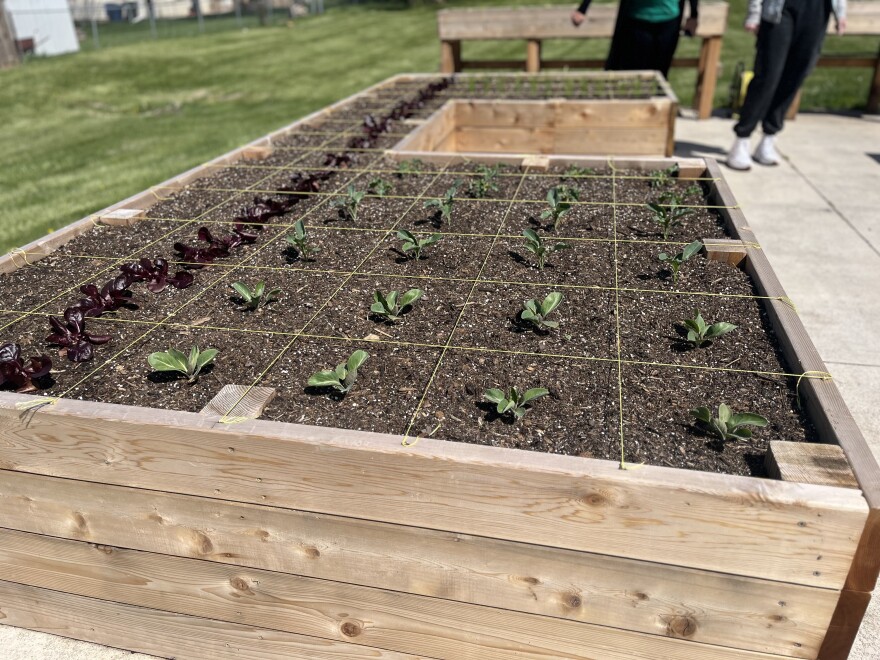An accessible garden project at Schramm Educational Center in Pekin will give students the opportunity to test out their green thumbs.
Planning for the project began pre-pandemic, but didn’t make it further than a slab of concrete behind the center. Anne Risen, a program coordinator with Tazewell-Mason Counties Special Ed Cooperative, saw value in finishing the project when she started at Schramm in 2023.
“I myself am very passionate about eating, sourcing locally from local farms as much as possible,” she said. “So the idea of bringing local fresh produce to our students through our own garden was exciting to me.”
The school serves special needs students aged three to 22. Risen says a project like this provides something different in the curriculum.
After getting approval to pursue the project again, Risen began looking for a builder and some funding.
The school applied for a grant from The Hambrick Foundation, which offers grants for educators who work in special needs environments. The foundation was started by autonomous vehicle company founder Bobby Hambrick, who was inspired by his special needs son, Truman.
He says they were excited to provide the $5,000 grant for the garden.
“It gets the kids out of the classroom, it gets working with their hands a little bit, it helps them understand how things are planted and cared for,” Hambrick said. “And then at the end of it, they receive some fruits of their labor, and then that fruits of the labor they can enjoy themselves or they can provide to others and then again, the next season, they can do it all over again.”
He said he likes this unique project.
“I think it gets the community involved,” he said. “It gets the teachers involved, it gets the kids involved, it gets the parents involved, and it's good for everybody.”
Risen then reached out to local organizations and agencies to build the garden beds, but found herself hitting roadblocks until she realized the answer was right in her own kitchen.
Evan Barry is the former owner of Down River Farm. Risen had been buying produce from the farm for years and asked Barry to help design and build the garden. Barry said yes.

He said the project began in September with brainstorming what the garden should look like. Barry said the main two beds are built in a "U" shape, making them accessible for students in a wheelchair. Two more raised beds let students sit at them like a desk.
“Really my goal was like ‘how do I make this not only like physically accessible, but very simple to manage, and simple for students that age to get something out of,’” Barry said.
Risen said accessibility is paramount.
“There's going to be a varying degree to what our students can do,” Risen said. “Many of our students went out and helped fill the garden with soils, some even just taking a bucket and helping to fill or small Tupperware and helping to fill and be a part of the process.”
They created a grid system in the garden beds with twine to separate foot by foot squares,
“It's really easy for them, I can just say plant 12 seeds in this square plant, one tomato plant in this square plant, two lettuce plants in this square,” Barry said. “So we're trying to keep accessibility in mind and also what will the final curriculum look like? How can this be educationally advantageous for them?”

Risen said they hope to create a curriculum to educate students on what they're growing and the benefits of healthy eating.
Seeds are currently sprouting in the garden. Risen says they're growing lettuce, carrots, peas and tomatoes. She says she wants students to be involved in every step of the process
“From going out and weeding the garden and harvesting the vegetables potentially to offering vegetables to our staff and our families,” she said. “We've thought about having like a little produce stand here at school and our students could potentially work the produce stand and so there's lots of potential there for what our students can do to help support and be a part of this.”
Risen says they're looking into having their cook utilize vegetables for potlucks and she wants to share the produce of families.
Risen hopes students will also get to put their chefs hats on.
“I think there's bigger dreams and goals to maybe look at building a little like the student led business, where maybe we're making salsas and selling in a local farm local farmers market,” she said.
Risen said for now the goal is to get students outside, get their hands dirty and to see green things grow.


